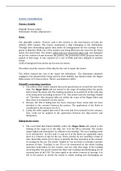Samenvatting
Summary All case law Commercial Law summarised
- Vak
- Commercial Law
- Instelling
- Erasmus Universiteit Rotterdam (EUR)
All Case Law summarised Pyrene v. Scindia Aluminium Industrie Vaassen B.V. v. Romalpa Aluminium ltd. The Hansa Nord Bunge v. Tradax Kwei tek Chao v. British Traders & Shippers Rafaela S MSC Amsterdam (CA) The Jordan II Heliopolis Star (Hoge Raad, 21 januari 1995) - Dutch Damco v. Meister (Hoge Raa...
[Meer zien]




